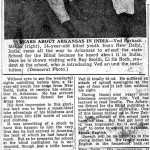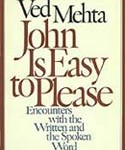‘There Was Salman, Shouting Away’
Salman Rushdie
I met Ved through a television producer called Nick Fraser right at the birth of Channel 4 back in 1980. At the time, Nick was producing a half-hour talking-head slot called Opinion which, in those more innocent days, allowed people to express vary extreme views on mainstream television. I recorded a talk about racism in Britain and then Ved went into the studio to record his talk. Or maybe it was the other way round. Whichever, he heard what I was saying and we talked afterwards.
As a young man, I had read him a lot. So I’d met Ved many times through his writings much earlier than in that studio. It was very interesting to meet him. I am surprised, in retrospect, that we hadn’t collided before. Those of us who are Indian writers in the English language do tend to run into each other. We had people in common, such as the Indian poet, Dom Moraes, who had collaborated with Ved on a book called Walking the Indian Streets. It was one of the first books of Ved’s I had read. I’d also read his Portrait of India which was important just as I was starting to think of Midnight’s Children.
Nick Fraser used to give dinners and assemble various people who he was working with. After the recording, Ved and I met there. What had struck me about Ved’s writing, also struck me about him. He is intensely visual. He tells you what colour things are. He describes the natural world in great detail. Clearly, that is a decision for a blind writer: to write as if you were not blind. And he behaves like that when you’re with him. I don’t quite know how he does it but he seems able to behave as if he can see.
For the past five years I have had a place in New York and spend more time there than in London. And that has meant running in to Ved, as he also lives there. Only recently, in fact, there was a dinner given for the writer William Dalrymple in an incredibly grand Upper East Side apartment. Ved was there. We spent a lot of the evening talking.
I like his inner way. He has a mildness that I think has something to do with blindness, and a quality of acceptance that it has brought out in him. My instincts are more argumentative, but I don’t want to spend time with people like me.
We talk about many things. He feels his work is now being overlooked, which makes me very sad after his long and distinguished career, but I suppose the cycles of literary fashion are relentless and happen to everyone. Some writers can be different from book to book to suit the fashions, but others, like Ved, are themselves and their books are an expression of that being in the world. To change would, for him, be false.
Ved Mehta
I met Salman through a friend from New York. Nick Fraser was a television producer and he had come back to London and commissioned a series called Opinion on Channel 4. He rang and asked me to do one of the slots. I’m really a writer who, rather like Plato, believes opinions are false but I agreed to do a piece about being blind in a sighted society. I came over and recorded the piece and who should be in the next studio but Salman.
I listened to what he was saying and was absolutely amazed. I had given a quiet, discreet piece, but he gave this fiery talk about racism in England. Years before, I’d been an undergraduate at Oxford and had been treated as a piece of exotica. I’d never been discriminated against. Quite the contrary. But there was Salman, shouting away about how awful this country was to its immigrants.
I am shy by nature, but I did know Salman’s then wife, Clarissa, who was a lovely, willowy blonde woman who worked at my literary agents. So I gently walked up to Salman and said, “I’m rather astonished at your attack on the British for racism.”
It was the beginning of what is not a friendship in the conventional sense. It is a literary friendship. The link is through our work. I like the company of other writers. I find it reassuring that there are other people working in the vineyards, other people bearing the cross.
From that very first meeting, though, I knew Salman and I were born under different stars. I think he is much more connected to the Indian subcontinent than I am. I was away for 17 years at one point. His writing is very different from mine. I am a strict grammarian. I write very finished prose. His is disjointed, much more the contemporary type of writing. He is also a very courageous writer, very provocative, which I admire but it is not the kind of writing I could ever do. Salman is some kind of literary phenomenon. I don’t know anyone whose books have caused so much anger and admiration.
I saw him recently in New York. We ended up standing together for most of the evening at the edge of the party as it swirled around us. I didn’t know many people there. Salman rescued me. When he wasn’t standing he had his new wife on his lap. That is not a usual behaviour at a party of that kind in New York but he is very bold and he does what he feels like. He’s not bothered by what people think or say.





